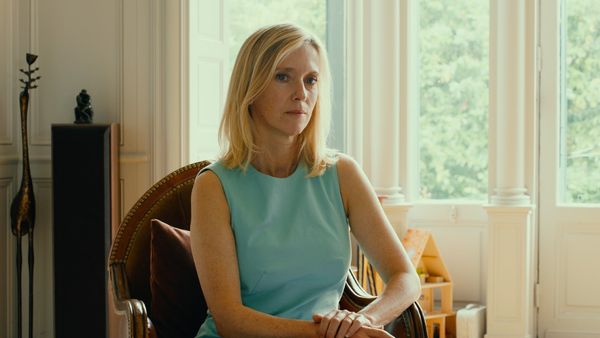Catherine Breillat’s Last Summer (L’Été Dernier, written in collaboration with Pascal Bonitzer, original music by Kim Gordon, and a highlight in the Main Slate of the 61st New York Film Festival) stars Léa Drucker and Samuel Kircher with Olivier Rabourdin, Clotilde Courau, Serena Hu, and Angela Chen. The film is based on May el-Toukhy’s 2019 Queen of Hearts (Dronningen, co-written with Maren Louise Käehne), starring Trine Dyrholm, Gustav Lindh, and Magnus Krepper. Last Summer shares a theme with the NYFF Opening Night Gala selection, Todd Haynes’s May December (Natalie Portman, Julianne Moore, and Charles Melton), where a reversal of age also takes central stage.
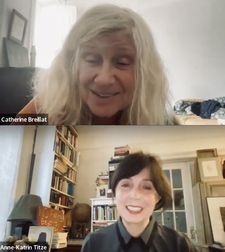 |
| Catherine Breillat, with Anne-Katrin Titze, reveals the Christophe Honoré, Winter Boy, Paul Kircher and Samuel Kircher connection for Last Summer |
Breillat, incomparably daring as ever, tells the story of Anne (Drucker), a successful lawyer, who lives with her businessman husband Pierre (Rabourdin) and their two headstrong, adopted daughters, Serena (Hu) and Angela (Chen), in a beautiful, cool, well-ordered home. All white and cream and easily stainable, the house resembles Anne’s Hitchcock heroine wardrobe. When Pierre’s 17-year-old son from his previous marriage, Théo (Kircher), comes to live with them, nothing remains the way it was. Anne’s transgressive desire step by step will transfigure a calm that maybe never existed in the first place.
We first meet Anne with one of her clients, asking the teenager how much alcohol she consumed on a specific night and how many boyfriends she had had. “More than ten or less?” She asks the girl to better protect her from a long tradition of victim blaming. Théo, who has a strained relationship with his father, is adored by the two little girls who present him with a home-made welcome gift that will prove to be an important plot point later and expose one of many lies. This is a movie of lies, with the most crucial ones being those to oneself.
Théo, the pseudo vegetarian, eats a burger at the picnic by the river, where he and Anne and the two girls swim, as we see a swan family with signets in the background. Angela and Serena talk about werewolves in the car when their mother drives them to their horseback riding lessons. Anne leaves, while she and her husband have guests over for dinner; she can’t stand listening to the same dead toad story one more time. Each scene of seemingly quotidian normalcy contains kernels ready to pop. All the while, the intensely impatient relationship between Anne and Théo intensifies and morphs into unforeseen terrain.
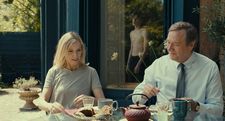 |
| Anne (Léa Drucker) with her husband Pierre (Olivier Rabourdin) as her stepson Théo (Samuel Kircher) watches them |
From Portugal, Catherine Breillat joined me on Zoom for an in-depth conversation on Last Summer.
Anne-Katrin Titze: Catherine, hi! Are you in Portugal?
Catherine Breillat: Hi, yes, I’m in my home in the Algarve in the South. I have two homes, one in France and one in Portugal. For the winter it’s much better to be in Portugal. It’s a pity we couldn’t get together in New York!
AKT: I know. I tried. I am very happy to speak with you about Last Summer. The first person who brought the film up to me was Christophe Honoré. He told me that you wanted Paul Kircher [star of Honoré’s Winter Boy] for the role!
CB: Yes of course! But it was the year before and we couldn’t find the money to finance the film the first year. So Christophe found Paul and after that Paul made Le Règne Animal (The Animal Kingdom) and I was so sad that I didn’t have him because I made a casting with all the young actors of Paris and I called Paul and I said, now I have to make a much worse film because of you! Because they all bore me. You were champagne! Then he said, I have a little brother! And Samuel didn’t think about becoming an actor, he was passing his baccalauréat. In the morning baccalauréat and in the afternoon the first love scene.
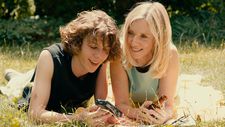 |
| Catherine Breillat on Anne (Léa Drucker) with Théo (Samuel Kircher) on the grass: “It becomes so emotional that we understand that what happened to her adolescence is really very grave.” |
AKT: Wow! He is a revelation. It’s incredible what you get in the scenes with him and Léa Drucker. There is so much going on at once, the scenes are so full.
CB: I think, and in fact Paul and Irène Jacob, their mother, think also that for my film Samuel is better because he is younger; he was really a kind of child. So when he appears you don’t think he can become a lover, he’s just a child.
AKT: There is a contrast in how you present the pristine house and his arrival like a hurricane with all the mess he makes. Also the contrast in clothing - she is always in beige, cream, white, ready to be soiled in a way. Tell me about the house and the costumes!
CB: The costumes, you know, it’s exactly the manner of cut from the 1950s. American stars like Rita Hayworth, all of them wore that sort of line. I still have some of those I bought for Perfect Love, which you haven’t seen in America, and also for Fat Girl. Arsinée Khanjian wears a dress with exactly the same cut. Here I had the costumes made but the line and manner of cut is the same.
AKT: It’s the Hitchcock heroine style!
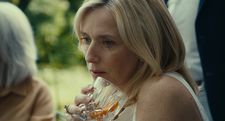 |
| Catherine Breillat on Léa Drucker’s Anne: “She is completely within herself …” |
CB: Oh yes! I was very very inspired by Hitchcock because first I said to Léa, think about Vertigo and Kim Novak! But then I think she is more Tippi Hedren.
AKT: Yes, Marnie.
CB: Yes, and in fact during the shooting I realised it is almost the same character as Marnie. But it was not written in the script, it is because of the scene on the grass when it becomes so emotional that we understand that what happened to her adolescence is really very grave. But that I did shooting, because it was not written as such an emotional scene. It is when he questions her about her first time with the recorder.
AKT: Now that you mention it, Marnie also has the transgression that she cannot stop, the way Marnie cannot stop stealing.
CB: And she is also very frigid, Léa Drucker’s character. Her jouissance is like that [Catherine makes a fist]. She is completely within herself; she’s a very frigid woman, very broken, in fact.
AKT: Broken, you say - we don’t know much about their background. We have the sister and we can guess the background via the mirroring of the sister who has a beauty salon. We get the idea that they come from a different background.
 |
| Théo (Samuel Kircher) giving Anne (Léa Drucker) a three-dot tattoo |
CB: Yes of course. Léa becomes Anne, a very successful lawyer.
AKT: The first scene when she questions the girl is another mirror. These are perhaps parts of herself, I thought.
CB: There’s work, work, work. No sentiment, no feelings, but Théo also says it in the bar, feelings are not for him. Every character lies. They, too, lie to themselves. He thinks it’s not a drama, the first time. It’s like that, not so important. And she also.
AKT: The lies and revelations add many layers for us, too. Because we believe some of the lies and then have to go back and rethink.
CB: I think the film is very complex. All the characters are very complex, like in life. I didn’t want for the film something Manichean in the judgment.
AKT: Manichean in the judgment it is not! With three dots of the tattoo he brands her! That is another very intense scene!
CB: Yes and very pleasant and amusing to do in fact!
 |
| Pierre (Olivier Rabourdin) confronting his wife Anne (Léa Drucker) |
AKT: Because?
CB: Because it is with the arm like a fetishist! Like a little boy doing the application with his mouth open! Like when you learn to begin to write.
AKT: He often has his mouth open I noticed. Like a baby almost.
CB: Yes! Samuel also was like that!
AKT: And at the same time, Léa becomes a teenager herself.
CB: Yes. As a filmmaker, I think, but in life also, the look, the gaze does that. The way he looks at her with love and thinks that she is beautiful and flirts with her as if she were 15. So she becomes 15. And it is an attraction with each other. Of course they are obliged to this attraction which makes each other beautiful and light. So I think it’s impossible to not give in to the temptation.
Until I made the first closeup of Samuel I didn’t know that he was so pretty. Always smiling and his teeth so beautiful like pearls. My assistant said to me, ah, we want to be Léa. If you want to be her, I think, gagné! If you are her, you understand perhaps that the temptation is too strong. Everybody, we are not infallible, we are not Savonarola. And me, I don’t like people who never can make a fault, a mistake. Yes, it’s a fault, but it is not a crime.
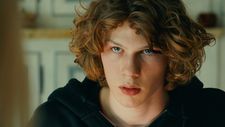 |
| Catherine Breillat on Théo (Samuel Kircher): “Feelings are not for him.” |
AKT: You also explained how he sees her and the desire being the desire of the other, see Lacan. It’s all in there.
CB: As a filmmaker, I can show that! Of course Léa becomes an adolescent, you don’t think about the difference in age very quickly.
AKT: She becomes what she sees him seeing in her - it’s fascinating. I also have to talk with you about the girls, Angela and Serena. They are fantastic little whirlwinds.
CB: And I cut cut cut marvelous responses because I have to have the story of Léa and Samuel in line, like a string. I have to be constant. But I can make a short film with Angela and Serena. I cut cut cut but they are unbelievable!
AKT: How did you find them? A casting and they showed up?
CB: A casting! Afterwards I also said to Samuel, to be close with them. He likes children very much. It was more difficult with Léa because Serena liked only men. She doesn’t like women.
AKT: Oh gosh!
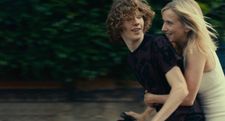 |
| Théo (Samuel Kircher) with Anne (Léa Drucker) on the bicycle |
CB: There’s a woman behind the camera, my assistant was a woman, I am a woman - she didn’t want the first time to talk with her [Léa], only with Olivier Rabourdin [who plays their father] and Samuel.
AKT: That’s so funny! She’s a little devil. The song at the end is a beautiful way to send us out of the cinema.
CB: It’s the Kim Gordon one you are talking about?
AKT: No, the one over the end credits. I think I scribbled down it’s from 1961 and the lyrics say something to the effect of, being vingt ans, still 20 years old?
CB: That’s Léo Ferré. Suddenly I thought about this song I love very very very much. Léo Ferré is a genius in French - when you translate the lyrics you don’t have the sound of French and the music and freedom and how he jokes with words. In French it’s really impressive.
AKT: It’s a wonderful way to have the film linger on. I saw the Danish film [Last Summer is based on] and it’s so different!
CB: It’s completely different and at the same time, I really did not change the dialogue that much. I just disturb the dialogue to the emotions and the relationship between the two is not then same because I am closer with Musset and Marivaux. And not the Nordic.
 |
| Catherine Breillat on Léa Drucker’s Anne: “Of course Léa becomes an adolescent, you don’t think about the difference in age very quickly.” |
AKT: I mean, I love Trine Dyrholm, she’s a wonderful actress, whom I spoke with a number of times. But it is fascinating to see how it becomes a totally different film in different hands and how much the acting changes the effect the story has.
CB: Yes, I say that especially to the Danish journalists who are a little furious that I made this film and that it was selected for Cannes and not the Danish film. And I say, but Léa Drucker is not a remake of Trine! It’s completely different and the incarnation in film is so important. It changes completely the film.
AKT: Are you working on another film?
CB: Yes! It’s a romance. But it’s a true story. Almost the same love story but true.
AKT: Looking forward to it! Thank you so much, Catherine!
CB: Thank you! I’m very happy to see you! Zoom is an excellent way to talk to each other. So happy to see you again!








